- Home
- Seanan McGuire
Laughter at the Academy Page 14
Laughter at the Academy Read online
Page 14
Maya smiles, the same sweet, guileless smile as ever, and flexes her cunningly articulated hands as she says, “She’s good. Strong. She can climb a tree so fast, and run so far. She’s amazing.”
“She was always amazing.”
Maya’s smile fades. “Dr. Williams…”
“I know why you’re here. What I don’t know is why it’s so soon. Are you following my directions? You don’t want to risk overusing those drugs. You could seriously hurt Emily.”
From the way Maya’s eyes dart to the side and down, I know exactly what’s going on. They’re a community of children and toys, after all; they know what we taught them, and we taught them to play fair, to be nice, and to share.
I want to scream. I settle for taking a deep breath before I say, as calmly as I can, “Maya. Those drugs are for Emily, do you understand me? I understand that she wants to share what she has with the other children, but they’re hard for me to get without raising suspicion, and if you share with everyone—”
“But she isn’t the only child on the edge, Dr. Williams, and we haven’t been able to get the Broken to agree to let us return them!” Maya clenches her cunning little hands into fists, looking at me imploringly. “How can I tell my brothers and sisters they have to let their children grow up while mine doesn’t? The Broken took one of Emily’s best friends yesterday. All she could do was cry. How can we do anything but share?”
Oh, Emily. My precious girl, with a heart big enough to hold the whole world, even when the world wasn’t worth holding. I close my eyes for a moment. “I’ll give you what I have,” I say, finally. “It’ll be at least two weeks before I can get more. You can share, but you have to keep most for Emily. Promise me, Maya. Promise Emily gets as much as she needs.”
“I promise,” whispers Maya.
She loves Emily as much as I do. I believe that; I believe her. And so I take the hormone patches from my desk drawer, each loaded with their payload of drugs and chemicals intended to suppress the signs of puberty, and I give them to the doll who stole my little girl. They won’t keep the children small, but the toys don’t see height as a sign of adulthood. They measure in breasts and hips and pubic hair, and those are things I can prevent, at least for now.
I am colluding with the enemy. It would be my life if I were ever caught. But this is all I can do to save Emily, and I would do anything to keep her alive. Anything. Even stay here when everything I am screams at me to follow my daughter’s doll into the wild. The toys would kill me. Worse, they would kill Maya for coming to me, and without the drugs that keep my daughter frozen in her prepubescent body, they would kill Emily as well. My stillness buys her life. My stillness buys her time. And here, now, in this nightmare we have built for ourselves, time is all we have.
Maya climbs out the window and is gone, her precious burden filling her bag to bursting. I watch until she is out of sight, and then I turn away, going back to my paperwork.
The war is over.
The war will never end.
The next night, a different group fills the community center, a different moderator from FEMA sits at the front of the room. I am here to make up for last night’s failure to share. Even my work is not a sufficient excuse. This time, when the moderator scans the room, his eyes fix on me. He has a file, of course—they all have files—and he knows I was here last night, and he knows I kept my tongue.
“Dr. Williams?” he says. “Would you like to share?”
No. “My name is Morgan,” I say, and the room choruses my name back at me dutifully, all of us prisoners of war, conditioned in the art of the proper response. “My daughter’s name is Emily. She’ll be eleven years old this summer…” And I talk, and I talk, and all I can think of is a picture of a house, drawn in crayon, and a doll intended for make-believe fashion shows trudging into the wilderness with her bag full and her glass eyes eternally bright, and a little girl somewhere out there, somewhere far away from me, running wild in the green places of the world.
The Lambs
This is another one written for Jennifer Brozek, for the anthology Bless Your Mechanical Heart, which was all about robots interacting with humans. It has always felt, to me, like a slice of something much larger: one day I’m going to shake it until the book falls out.
Bullying is a epidemic in our culture, and it can be a fatal one. We say “don’t be a bully” and “conform so they’ll stop hurting you” in the same breath, and sometimes it seems like no one catches the inherent contradiction in those two statements. As someone who was heavily bullied in school, it’s a topic that still consumes my thoughts at times, even when I wish it wouldn’t. Sometimes the only thing I can do is choose kindness, over and over, and hope that it will be enough.
Robots would help, though.
Contains ableist language, gendered slurs, and themes of bullying, abuse, and surveillance as a means of guaranteeing good behavior.
The bell rang for first period. I wanted to answer it—my programming told me I should be rushing to my normal seat in the front row, looking eager to fill my head with more rote memorization. Math was one of the classes where I was designed to excel this cycle, as girls who were overly adept at mathematics had been found 16% more likely to be targeted for opportunistic bullying, and 42% more likely to inspire hostility and a lack of generosity in classmates.
The figures were apparently good, as I was about to be late to class due to being pinned against my locker by two of the larger members of the football team. One of them had been in my assigned cycle since the second grade; my files contained no flagged recordings of him prior to freshman year, when a growth spurt and the acquisition of several new “friends” had transformed a relatively thoughtful, soft-spoken boy into a trainee terror of the halls. The other was new as of this year, and already had three hours’ worth of data for me to review before graduation. The second boy’s girlfriend stood nearby, averting her eyes. She wasn’t going to help me, but she wasn’t going to participate either.
It’s funny how some people continue to regard that as somehow “better.”
“We’ve been thinking,” said the second boy, stretching his vowels out in a long, lazy drawl. “It’s almost graduation, and that means some of us might find ourselves in a little hot water with our folks, you know what I mean? I moved here in part to avoid that, but things happen.”
I frowned, keeping the right mixture of fear and bewilderment in my expression, even as I raged behind the crafted blue lenses of my eyes. Things happen? As if he had no power over those “things.” As if he had wound up in my files by accident, and through no fault of his own. “I-I don’t know what you mean,” I stammered, and shrank further back against the locker. “Tom? I don’t know what you and your friend want, but I’m going to be late to math—”
“Just shake the geek down for what she knows,” said the girlfriend, glancing over her shoulder at us. Her eyes raked over me in the silently assessing way long since perfected by popular girls the world over. We all shared that look back and forth across the network at night, trying to find a way to put it into words, to add it to the report. No one had found one yet. It wouldn’t matter how advanced our reporting systems became; there would always be horrible things humans could do to each other that we wouldn’t be able to explain.
“I’m on it, Patty,” said the second boy, with a sneer that implied Patty—in all her manicured, perfectly coiffed glory—was little better than I was. He turned his attention back to me. I was glad. That was our purpose, after all: we deflected. We kept them from each other’s throats by focusing them on ours.
Sometimes I just wished it wasn’t so hard.
“We’ve been thinking,” he said again, this time accompanying his words with a shove to my shoulders. Not much, but it was enough to slam me against the lockers in a way that would have hurt, if I’d been wired for pain. I whimpered. Even though he didn’t smile, I could see his eyes light up at the sound. “You’re a nerd. Everybody knows that, just like
everybody knows you’re in line to be valedictorian. That means you can’t be our snitch—no honors for the fake kids—but you’re smart. I bet you know who it is. So tell us, and you’ll have our protection for the rest of the school year. Scouts’ honor.”
The offer was tempting, in a perverse way. It could get exhausting, dealing with the things they did to each other—the things they did to us, believing we were like them—for class after class. But I knew what happened to “snitches” who got caught by their year group before the end of the term. We all knew. There was no one I could point the finger at, and my year group hadn’t been equipped with a second lamb.
“I don’t know,” I whimpered, before continuing, speaking ever faster: “I’ve been trying to figure it out all year it’s a really great problem and I was sort of a mean girl in second grade, I’m terrified of my parents hearing the things I used to say on the playground, but I haven’t been able to even guess, they say it could be anybody, it could even be one of you trying to trick me into disrupting the system—” I was crying by the end of the sentence. It was one of my better performances, if I did say so myself.
“I told you the nerd wouldn’t rat on the robot,” snapped the second boy, giving me another, harder shove. This time my head bounced off the locker with a hollow bonging sound. I whimpered, letting my knees buckle. He didn’t hold me up.
His name was Ryan. I pulled his file from the network and began annotating, words and sound files flashing behind my eyes.
“Ryan, come on, let’s go,” said Tom. He glanced down at me, looking pained. The boy I used to play with during recess was still in there, it seemed, buried under a layer of social expectations and poor decisions. I was almost sorry to see that. It hurt more when they endured. His hand on Ryan’s elbow, he tugged, pulling the other boy away before things could escalate further. “We’re going to be late.”
“Whatever.” Ryan shook him off, and the three walked away down the hall as the final bell rang. None of them offered to help me up.
I collected myself, smoothed my shirt back into place, and scuttled down the hall toward my math class. I would get a reprimand for being late. That was all right. What mattered was that I was the one who’d been slung against the locker, and not anyone else. That’s what I was here for: to take the abuse the other students shouldn’t have to bear.
Mr. Groblek was well into his lecture on the importance of Calculus in our future endeavors when I slipped into the room, trying to make myself look small. He paused, taking in my disheveled appearance and the fact that my backpack was only halfway zipped. Something that looked very much like pity flashed across his face, and he nodded his chin toward an open seat at the back of the room. My cheeks reddened with simulated relief—no reprimand for me today, not from a teacher who’d been doing this for long enough to recognize the signs of a hallway altercation—and I scuttled to the waiting chair. Snickers and soft jeers of “Teacher’s pet,” rose as I sat and unpacked my math book. A few students kept their eyes fixed straight ahead, neither adding to my presumed embarrassment nor trying to make me feel any better. Only two of my classmates cast sympathetic looks in my direction, and they were both in the afterschool Math Club with me. They understood what it was like to be the one up against the locker.
Not as well as they would have twenty years ago. The Lambs had begun rolling out at the middle school level twenty-one years before Mr. Groblek’s class bell. We’d been early models then, easily detected novelties that didn’t have the support or elaborate backstories we would eventually accumulate. My first host family had lost a daughter to suicide after an ex-boyfriend had distributed shirtless pictures of her to most of their mutual classmates. Her name had been Beven. She had been beautiful.
She still was. The artificial skin that covered my chassis got more detailed with every cultured generation, and I was now the absolute picture of the girl Beven would have been at seventeen, if she’d been allowed to live that long. Her mother sent me Christmas cards, and asked for copies of my school pictures every year. It was technically a breach of operational security to send them, but I did it anyway. It was the only human thing to do.
“Miss Carter?” From the annoyed edge in Mr. Groblek’s voice, he had already said my name at least once, and probably more; he was definitely regretting allowing me to take my seat without a reprimand. I jerked my eyes away from my math book, cheeks burning again, this time with more genuine embarrassment. He looked slightly mollified when he saw my face. “Did you have the answer to problem five?”
This was familiar ground. I cleared my throat like I was nervous about my results, and said, “I think so…” From there, it was just a matter of reciting figures with careless ease, gaining glares from my less-able classmates and admiring looks from my fellow Math Club members. It was a foolish thing for me to do—it could have blown my cover—but I didn’t care, really. It was the last semester of senior year. I was going to be relocated and reskinned in a matter of months, placed with a new host family and prepared to enter first grade. Let me have my fun. I’d earned it.
The Lamb program came about at the end of the twenty-teens, when two things happened in unfortunately rapid succession: a man named Benjamin Wallace developed the first fully human-seeming robot in his Seattle lab, and his thirteen-year-old daughter committed suicide as a direct result of online harassment by a group of her more popular classmates. The classmates were tried for harassment under Washington’s Cyber-Bullying laws, and while they were found guilty, they served no jail time and were able to go on to their college careers unhaunted by what they had done. Dr. Wallace couldn’t reconcile the loss of his daughter with the seeming unconcern of her classmates—or worse, their parents, who continued to insist all the way through the trial that their children were innocent.
The first Lamb was enrolled in the local high school at the beginning of the following school year. He was just a prototype, found out quickly and unmasked by the student body, but not before he’d managed to record five hours of tape, all of which was played back for the parents of the kids who had bullied him. They could deny a lot. They couldn’t deny the voices of their own children saying terrible things to someone who they had believed to be another student, less than a year after one of their classmates took her own life.
There were lawsuits, early in; there were arguments about morality and the Heisenberg Principle, and whether we were doing any good by forcing the bullying to become less overt. But the voices of bullies played back through artificial mouths that couldn’t lie, and the schools that hosted our pilot program showed a measurable decrease in the suicide rate. The Lamb program worked. The lawsuits didn’t.
The program went national three years after the first prototype attended his first homeroom. Realistic robots in schools across the country, always hidden in plain sight, always listening, always watching, always recording. Some of us were found out, but with every generation and every update to the backstories and design schematics, more of us were making it to graduation, fulfilling our purpose in the most important way possible. We were making sure people remembered how much words could hurt, even when they thought those words had been thrown aside or forgotten. We were accountability writ large, and all I had to do now was make it to graduation.
The bell rang for the end of Mr. Groblek’s class. I stood with the others, ignoring the poisonous glares from certain corners of the room, and the ever more pervasive sneers of “Geek” that often accompanied those looks. I lingered at the back while the popular kids filed out, letting them have their space. It’s dangerous to challenge lions on the veldt, and while that might seem like a primitive way to describe the high school ecosystem, it was surprisingly apt.
The first Lambs got caught because they were too aggressive with their lions, needlessly challenging them to be cruel, making themselves into such perfect targets that they couldn’t possibly be real. Our programming has evolved since then.
“Beven? A word, if you don’t mind?”
I turned obediently to the sound of my math teacher’s voice, walking to the front of the room with an earnest, eager-student smile on my face. Sometimes Lambs caught teachers who did inappropriate things with their underage students. It wasn’t our primary purpose, and it wasn’t something I enjoyed, but we were reminded never to pass up an opportunity to spend time with our instructors, or to form the social bonds that might expose deviant behavior.
Mr. Groblek didn’t look like he was planning anything deviant. He was in his eighties, a man on the verge of retirement, who had seen his entire profession reinvented around him easily a dozen or more times since he taught his first class. He was looking at me solemnly, with something like concern in his rheumy blue eyes. “Beven, I was speaking to your guidance counselor yesterday, and she said something that worried me. Is it true you haven’t completed any college applications?”
Only the speed of my central processor prevented me from wincing. Lambs weren’t allowed to apply for college admission. It was illegal for us to disclose our non-human status on our applications, and we might prevent some worthy human student from getting a slot, at least until the school year ended and we inevitably outed ourselves. There was some discussion of allowing Lambs to apply, just to close one more loophole that could lead to identification. By the next time my picture in the yearbook appeared with a senior class, this might not be an issue.
“I’m planning to take a year off to volunteer with Doctors Without Borders,” I said, the old lie coming glib and easy to my tongue. “I have a really sound GPA, but my extra-curricular activities haven’t been impressive enough to get me into an Ivy. A few months helping to vaccinate babies against malaria and Hendra virus should be enough to move me to the top of the lists, even if I have to apply late to do it.”

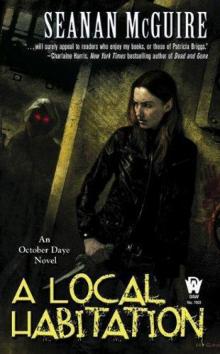 A Local Habitation
A Local Habitation One Salt Sea
One Salt Sea Beneath the Sugar Sky
Beneath the Sugar Sky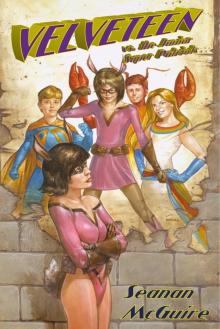 Velveteen vs. The Junior Super Patriots
Velveteen vs. The Junior Super Patriots The Girl in the Green Silk Gown
The Girl in the Green Silk Gown Midnight Blue-Light Special
Midnight Blue-Light Special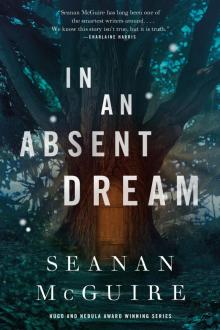 In an Absent Dream
In an Absent Dream Chaos Choreography
Chaos Choreography Indexing
Indexing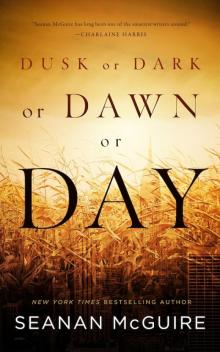 Dusk or Dark or Dawn or Day
Dusk or Dark or Dawn or Day Down Among the Sticks and Bones
Down Among the Sticks and Bones The Razor's Edge
The Razor's Edge Midway Relics and Dying Breeds
Midway Relics and Dying Breeds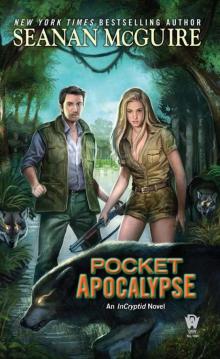 Pocket Apocalypse
Pocket Apocalypse The Brightest Fell
The Brightest Fell Discount Armageddon
Discount Armageddon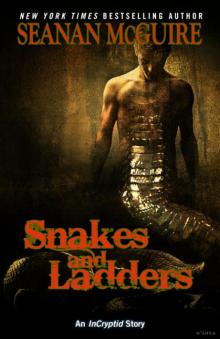 Snakes and Ladders
Snakes and Ladders Chimes at Midnight
Chimes at Midnight Broken Paper Hearts
Broken Paper Hearts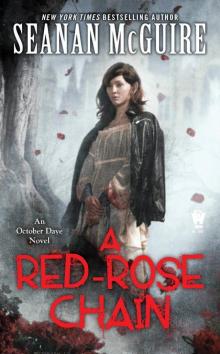 A Red-Rose Chain
A Red-Rose Chain Married in Green
Married in Green Sparrow Hill Road 2010 By Seanan
Sparrow Hill Road 2010 By Seanan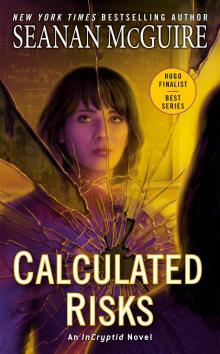 Calculated Risks
Calculated Risks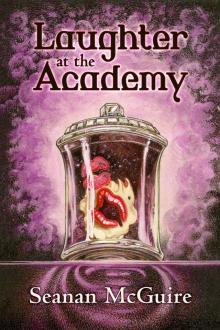 Laughter at the Academy
Laughter at the Academy The Winter Long
The Winter Long We Both Go Down Together
We Both Go Down Together Half-Off Ragnarok
Half-Off Ragnarok Velveteen vs. The Seasons
Velveteen vs. The Seasons Boneyard
Boneyard A Killing Frost
A Killing Frost Late Eclipses
Late Eclipses Submerged
Submerged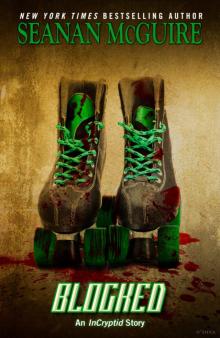 Blocked
Blocked Velveteen vs. The Multiverse
Velveteen vs. The Multiverse Night and Silence
Night and Silence The Unkindest Tide (October Daye)
The Unkindest Tide (October Daye) Come Tumbling Down (Wayward Children)
Come Tumbling Down (Wayward Children)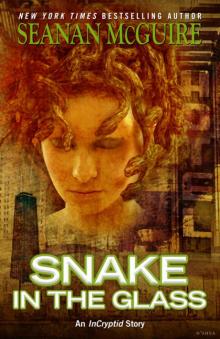 Snake in the Glass
Snake in the Glass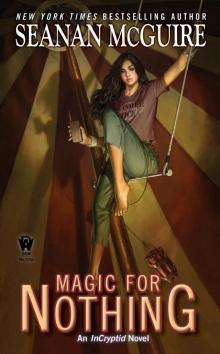 Magic for Nothing
Magic for Nothing Full of Briars
Full of Briars Oh Pretty Bird
Oh Pretty Bird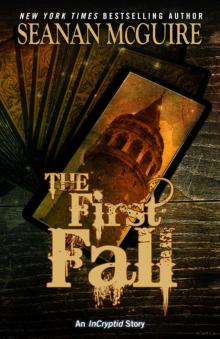 The First Fall
The First Fall Once Broken Faith
Once Broken Faith My Last Name
My Last Name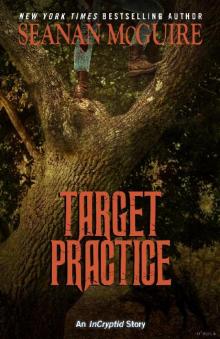 Target Practice
Target Practice Wayward Children 01 - Every Heart a Doorway
Wayward Children 01 - Every Heart a Doorway Sparrow Hill Road
Sparrow Hill Road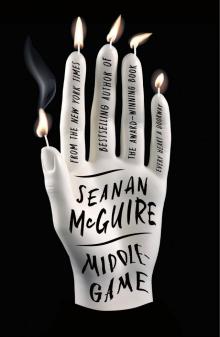 Middlegame
Middlegame Juice Like Wounds
Juice Like Wounds That Ain't Witchcraft
That Ain't Witchcraft Tricks for Free
Tricks for Free Imaginary Numbers
Imaginary Numbers The Star of New Mexico
The Star of New Mexico Lay of the Land
Lay of the Land One Hell of a Ride
One Hell of a Ride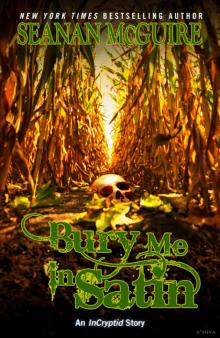 Bury Me in Satin
Bury Me in Satin Heaps of Pearl
Heaps of Pearl Sweet Poison Wine
Sweet Poison Wine When Sorrows Come
When Sorrows Come Every Heart a Doorway
Every Heart a Doorway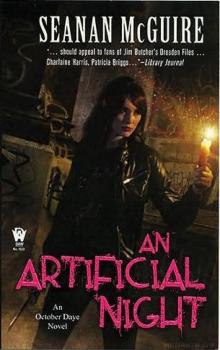 An Artificial Night - BK 3
An Artificial Night - BK 3 Rosemary and Rue
Rosemary and Rue Black as Blood
Black as Blood Loch and Key
Loch and Key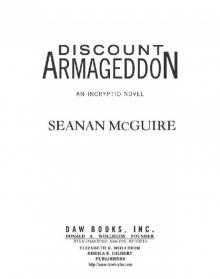 Discount Armageddon: An Incryptid Novel
Discount Armageddon: An Incryptid Novel The Unkindest Tide
The Unkindest Tide Ashes of Honor od-6
Ashes of Honor od-6 A Local Habitation od-2
A Local Habitation od-2 Waking Up in Vegas
Waking Up in Vegas The Ghosts of Bourbon Street
The Ghosts of Bourbon Street Midnight Blue-Light Special i-2
Midnight Blue-Light Special i-2 Bless Your Mechanical Heart
Bless Your Mechanical Heart Chimes at Midnight od-7
Chimes at Midnight od-7 The Way Home
The Way Home Indexing (Kindle Serial)
Indexing (Kindle Serial)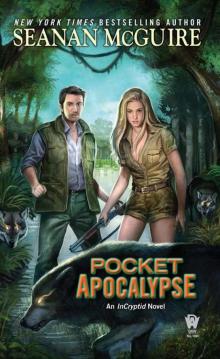 Pocket Apocalypse: InCryptid, Book Four
Pocket Apocalypse: InCryptid, Book Four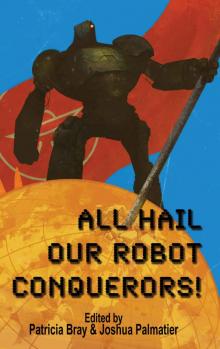 All Hail Our Robot Conquerors!
All Hail Our Robot Conquerors!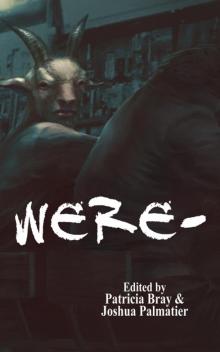 Were-
Were- That Ain't Witchcraft (InCryptid #8)
That Ain't Witchcraft (InCryptid #8) Night and Silence (October Daye)
Night and Silence (October Daye) Late Eclipses od-4
Late Eclipses od-4 Ashes of Honor: An October Daye Novel
Ashes of Honor: An October Daye Novel Midway Relics and Dying Breeds: A Tor.Com Original
Midway Relics and Dying Breeds: A Tor.Com Original Indexing: Reflections (Kindle Serials) (Indexing Series Book 2)
Indexing: Reflections (Kindle Serials) (Indexing Series Book 2) Chimes at Midnight: An October Daye Novel
Chimes at Midnight: An October Daye Novel One Salt Sea: An October Daye Novel
One Salt Sea: An October Daye Novel Rosemary and Rue od-1
Rosemary and Rue od-1 Rosemary and Rue: An October Daye Novel
Rosemary and Rue: An October Daye Novel Lightspeed Magazine Issue 49
Lightspeed Magazine Issue 49 Alien Artifacts
Alien Artifacts One Salt Sea od-5
One Salt Sea od-5 An Artificial Night od-3
An Artificial Night od-3 Discount Armageddon i-1
Discount Armageddon i-1